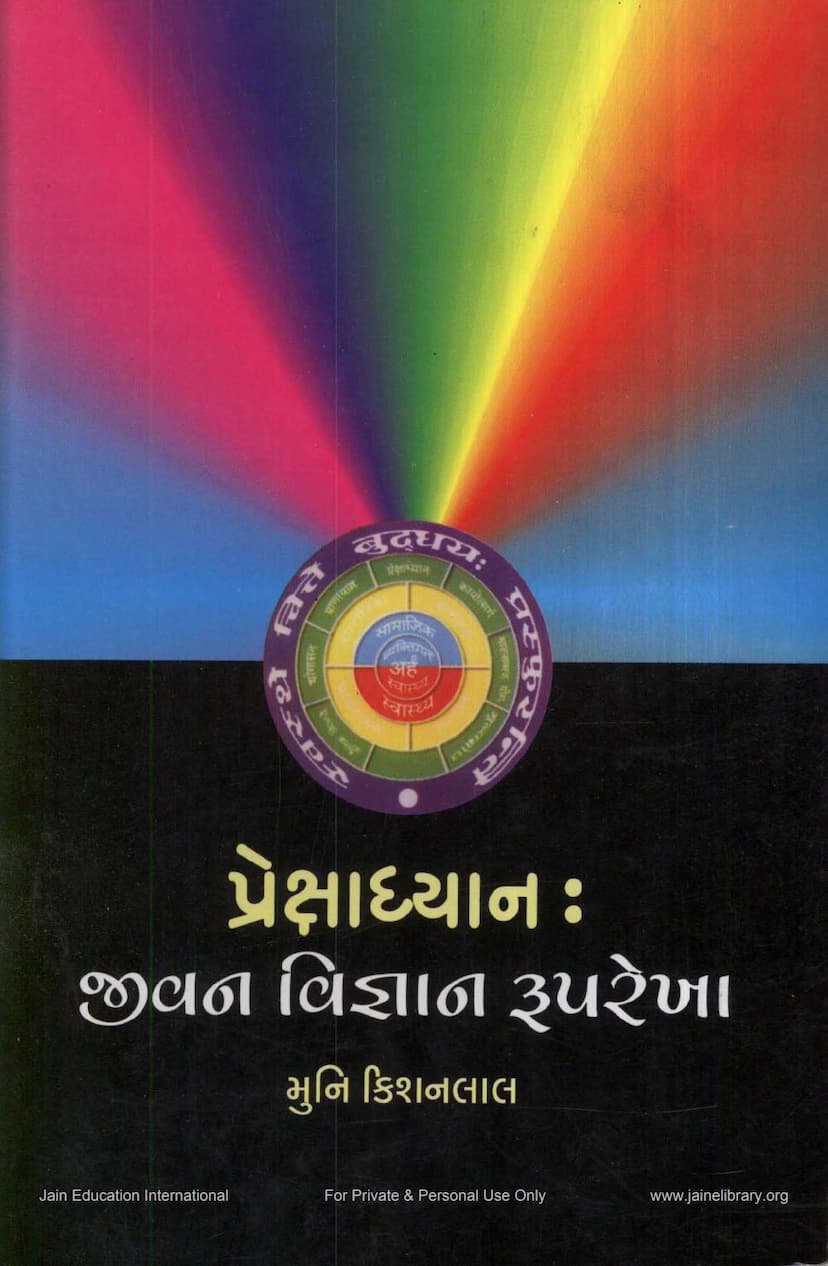Prekshadhyana Jivan Vigyana Ruprekha
Added to library: September 2, 2025

Summary
The book "Prekshadhyana Jivan Vigyana Ruprekha" (Outline of Preksha Meditation as Life Science) by Muni Krishnalal, published by Anekant Bharati Prakashan, serves as an introduction to Preksha Meditation as a life science. The book emphasizes that Preksha Meditation is not just for ascetics but is a vital tool for modern life, offering a way to overcome stress, improve physical and mental health, and foster emotional well-being.
The core of Preksha Meditation, as explained in the book, is "to see oneself with oneself" (Atmanātmanyālokanam) or "to see oneself through oneself." This practice involves deep, deliberate observation of one's inner self. The term "Preksha" itself is derived from the root "iksh" with the prefix "pra," meaning to see deeply or intently.
The book traces the origins of Preksha Meditation within Jain tradition, linking it to the practices of the Tirthankaras and ancient ascetics. It highlights the spiritual discipline prevalent in early Jainism, which involved deep meditation and austerity. The text discusses how this practice, though ancient, was given its modern name "Preksha Meditation" by Acharya Mahapragya under the guidance of Acharya Tulsi in 1975.
Preksha Meditation is presented as a comprehensive system for self-realization and personal transformation. It is described as a path that moves from the gross to the subtle, involving various dimensions such as:
- Kayotsarga (Body Observation): A technique for relaxation and releasing tension, promoting awareness of the body.
- Antaryatra (Inner Journey): A process to awaken energy centers and channel vital force upwards.
- Shwas Preksha (Breath Observation): Focusing on the breath to calm the mind and enhance concentration. This includes techniques like deep breathing and equal breathing.
- Sharir Preksha (Body Observation): Observing bodily sensations and changes without attachment or aversion, leading to detachment and self-awareness.
- Chaitanya Kendra Preksha (Consciousness Center Observation): Focusing on specific energy centers in the body, often associated with endocrine glands, to influence physical, mental, and emotional states.
- Leshya Dhyan (Aura Meditation): Understanding and meditating on the subtle colors of one's aura, which represent emotional and spiritual states, to purify them.
- Vichar Preksha (Thought Observation): Becoming aware of thoughts without judgment, leading to detachment from mental chatter and presence in the current moment.
The book stresses that Preksha Meditation is about apramada (non-negligence) – living consciously in the present moment, free from the past's regrets and the future's anxieties. It emphasizes the importance of mind-body purification through practices like bhāvakriyā (living consciously), pratikriyā-virati (abstinence from reaction), maitri (friendship), maun (silence), and mitāhār (moderate eating).
The text also highlights the practical application of "Life Science" (Jivan Vigyan) through Preksha Meditation in various sectors, including:
- Police Training: The book details how Preksha Meditation and Life Science programs have been implemented in police academies to improve the physical, mental, and emotional well-being of police personnel, leading to significant positive changes.
- Education: It advocates for the integration of Life Science and Preksha Meditation into educational curricula from primary to higher levels, aiming to develop character, discipline, and holistic well-being in students. The book mentions initiatives in Gujarat to incorporate these practices into the school system.
The book provides testimonials from individuals who have benefited from Preksha Meditation, reporting improvements in physical health, mental peace, emotional stability, and spiritual growth. These experiences range from relief from chronic pain and illness to profound shifts in perspective and life purpose.
Finally, "Prekshadhyana Jivan Vigyana Ruprekha" outlines the future potential of Preksha Meditation to transform individuals, families, society, and the nation by fostering virtues like friendship, compassion, and purity, and promoting a balanced and ethical way of life. It also introduces "Preksha Vishwa Bharati" in Gujarat as a significant center dedicated to these practices.